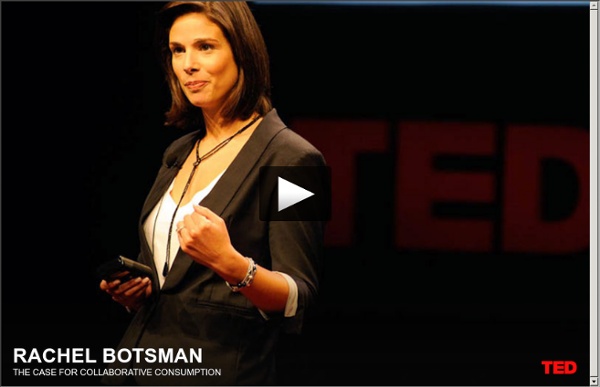



http://www.ted.com/talks/rachel_botsman_the_case_for_collaborative_consumption.html
DriveNow: BMW / Sixt Joint Venture - car sharing The BMW Group and Sixt AG are planning a unique and innovative car sharing venture. With effect from April 2011 onwards – initially in Munich and later in Berlin – the two companies intend to join forces in offering a modern mobility concept under the brand-name DriveNow; this new product will combine vehicles and service of the highest quality with simple, flexible usage. DriveNow is the first car sharing concept to place an emphasis on efficient premium vehicles and comprehensive service.
We Just Went Through 200 Years of Radical Economic Upheaval September 17, 2010 | Like this article? Join our email list: Teachers Training International – Helping you motivate, manage and engage your students One of the downsides of teaching is that in the process of educating our students about facts and figures we are also teaching our students how to think. For most teachers their initial response would be to not give this a second thought. However I wonder if this might be one of the greatest long term problems that education is facing right now. Watch the following two and a half minute talk clip and then I will explain my thoughts (the key thought happens at 2:26)
Shareable: Mais Oui, We Share Photo courtesy of Stefano Borghi “During the most impressive panel of the conference (that I saw), four whipsmart women talked about the intersection of the collaborative economy with government: Molly Turner, Director of Public Policy for Airbnb, April Rinne of Collaborative Lab, Helen Goulden from Nesta, and Anne-Laure Brun Buisson from Sharelex. They recommended a collaborative, non-oppositional relationship with policymakers and regulators, and pointed out that most governments are in crisis, already unable to provide basic services and facing more cuts.
The New Sharing Economy Technology is connecting individuals to information, other people, and physical things in ever-more efficient and intelligent ways. It’s changing how we consume, socialize, mobilize— ultimately, how we live and function together as a society. In a global economy where the means of production are becoming increasingly decentralized, where access is more practical than ownership, what do the successful businesses of the future need to know? What’s changed about our psychology of sharing? Is money the only, or even the most valuable, currency anymore?
Meta-currency - Rheonomy - Eric Harris-Braun In her beautifully insightful book, The Nature of Economies, Jane Jacobs suggests that we must broaden our understanding of economics in the context of the flow processes of the natural world. Near the end of the book one of her characters asks the question, “What are economies for?” One of the other characters answers: “… To enable us to partake, in our own fashion, in a great universal flow” Another character answers with “Economies have a lot in common with language… like language, economic life permits us to develop cultures and multitudes of purposes… that’s its function which is most meaningful for us.” America's Post-Ownership Future - Derek Thompson - Business We were promised an "ownership society."* It was President George W. Bush's campaign slogan when he ran for reelection in 2004.
Continuous Partial Attention What is continuous partial attention? Continuous partial attention describes how many of us use our attention today. It is different from multi-tasking.